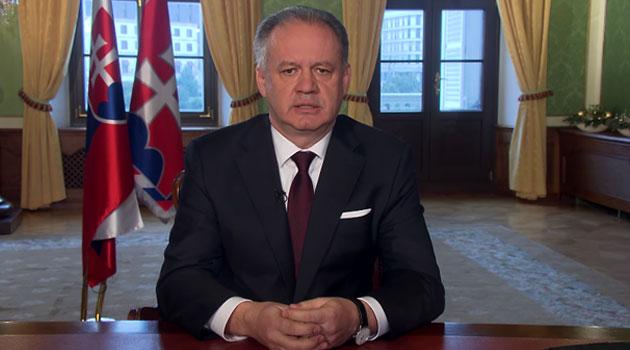Slovakia: Debacle in elections for the neofascists, Kotleba out as Regional Governor

Slovakia has directly elected Regional Governors and Regional Assembly members in the country’s eight self-administering regions. Marian Kotleba of the “People’s Party Our Slovakia” (LSNS), a neofascist, suffered a big defeat, losing to Jan Lunter by more than 20 percentage points and leaving his post as Banská Bystrica’s Governor.
In Nitra another neofascist candidate, Milan Uhrík, lost the Regional Governor race, winning just 15 % of the vote. The strongest governing party, Smer-SD, which governed six of the eight regions until Saturday 4 November, also suffered an enormous defeat.
Until 2022, Smer-SD candidates will govern just the Nitra and Trenčín Regions. For Slovak Prime Minister Robert Fico this is one of the biggest electoral defeats of his career – apparently what harmed him was his party’s decision to repeal the runoff process for Regional Governor elections, which the Slovak President then vetoed.
“We seem to have won. I thank all voters for their faith in us. We are anticipating the results for the Regional Assembly candidates with great suspense,” Lunter said just before 1 AM CET on 5 November, by which time more than 65 % of the vote had been counted.
Lunter thanked his family and the candidates who had stepped aside so he could run. The Banská Bystrica victor, who won more than 48 % of the vote, said his first step in office will be to once again fly the flag of the European Union: “I will open the doors of the Regional Authority and air the building out. I will fly the flag of the European Union on the front of the building to demonstrate to all that we belong there.”
Second-place candidate Kotleba trailed the winner by more than 20 percentage points, receiving less than 23 % of the vote. Journalists were unable to find him for comment once the results were announced.
His fellow defeated neofascist, Uhrík, told the press that Kotleba would be awaiting the rest of the election results outside of the Banská Bystrica Region. “We have rid ourselves of evil,” Smer-SD vice-chair Peter Pellegrini said in response to the news that Kotleba’s time in office was over.
Smer-SD expressed its support for Lunter in the elections as early as the summer. Voter turnout was at a record high, according to the Slovak media, with almost 40 % participation in the Banská Bystrica Region, while estimates of statewide participation were just below 30 %.
During the previous regional elections in 2013, turnout was roughly 10 % lower. This year Kotleba’s party also ran 335 candidates for the Regional Assembly seats.
According to preliminary results, the online daily Deník N reported on 5 November that only two of his party’s candidates had won. Kotleba will now just be a Regional Assembly member in Banská Bystrica, while Uhrík will be a Regional Assembly member in Nitra Region.
Other well-known neofascists did not succeed in being elected to Regional Assemblies. Peter Krupa (LSNS), who ran in the Ilava precinct, did not succeed in the Trenčin Region.
Krupa won just 2.4 % of the vote. He had mainly become known for carrying a pistol into the Slovak Parliament and for his Facebook posts about “stinking kikes”.
In Trenčín Region, another famous Kotleba follower, Marián Mišún, who was running for Regional Assembly from the Púchov district, also went down in flames. He won approximately just 3.5 % of the vote.
Mišún is a former local police officer who today works as an assistant to Martin Beluský (LSNS). More than 4.4 million voters, incuding foreigners with permanent residence in Slovakia, decided who would represent them in the Regional Authorities.
Slovak media: Regional elections end with Fico’s party failing
Slovak media are reacting to the results of the regional elections by describing them as a catastrophe for the governing Social Democrats, a success for the right-wing coalition, and a defeat for Kotleba now that candidates from a broad right-wing coalition will be seated as governors in five of Slovakia’s eight Regional Authorities. The results were appreciated by representatives of the opposition.
“The regional political map is fundamentally changing, and while the defeat of Marian Kotleba in Banská Bystrica was anticipated, the vote has also confirmed the trend of Smer losing its position,” the Slovak daily Sme reported, noting that the outcome reflects growing dislike of Smer-SD’s policies, that the party is losing its ascendancy, and that Kotleba’s defeat by Lunter, an independent candidate supported by the governing coalition and by opposition parties, was “very good” news. “This demonstrates that if the public wants to, they are able to defeat the fascists, and that is the price we are paying for competition between ideas and solutions having practically disappeared from political life.”
“These were supposed to have been elections about Kotleba and the fascists. However, it rather seems that the voters said ‘goodbye’ to Smer as we have known it for the last 10 years,” reported Slovak daily Denník N, according to which Fico must now do a serious “restart”.
The Pravda newspaper reported that only the governing party has reason to complain after losing four Regional Governor seats. “Such an outcome for a party which just last week dominated regional politics in Slovakia is an unequivocal failure,” Pravda reported, adding that the fall of the party is a symptom of a serious crisis.
The Slovak edition of Hospodárske noviny reported that the regional elections ended with the unequivocal victory of the opposition and that Smer-SD had suffered a cruel defeat. That paper called the failure of the PM’s party the biggest surprise of the contest.
The outcome, as expected, was welcomed by the opposition. “It’s clear to see that people want change and the government of oligarchs and incompetent politicians is beginning to collapse,” Slovak MP Veronika Remišová said.
“It seems we have succeeded in defeating the Smer party in the regions, and I believe that two years from now, we will manage to do so during the parliamentary elections as well,” she said. Remišová is one of the main faces of the opposition movement called “Ordinary People and Independent Figures”, two MPs from which were elected Regional Governors as part of the right-wing coalition.
